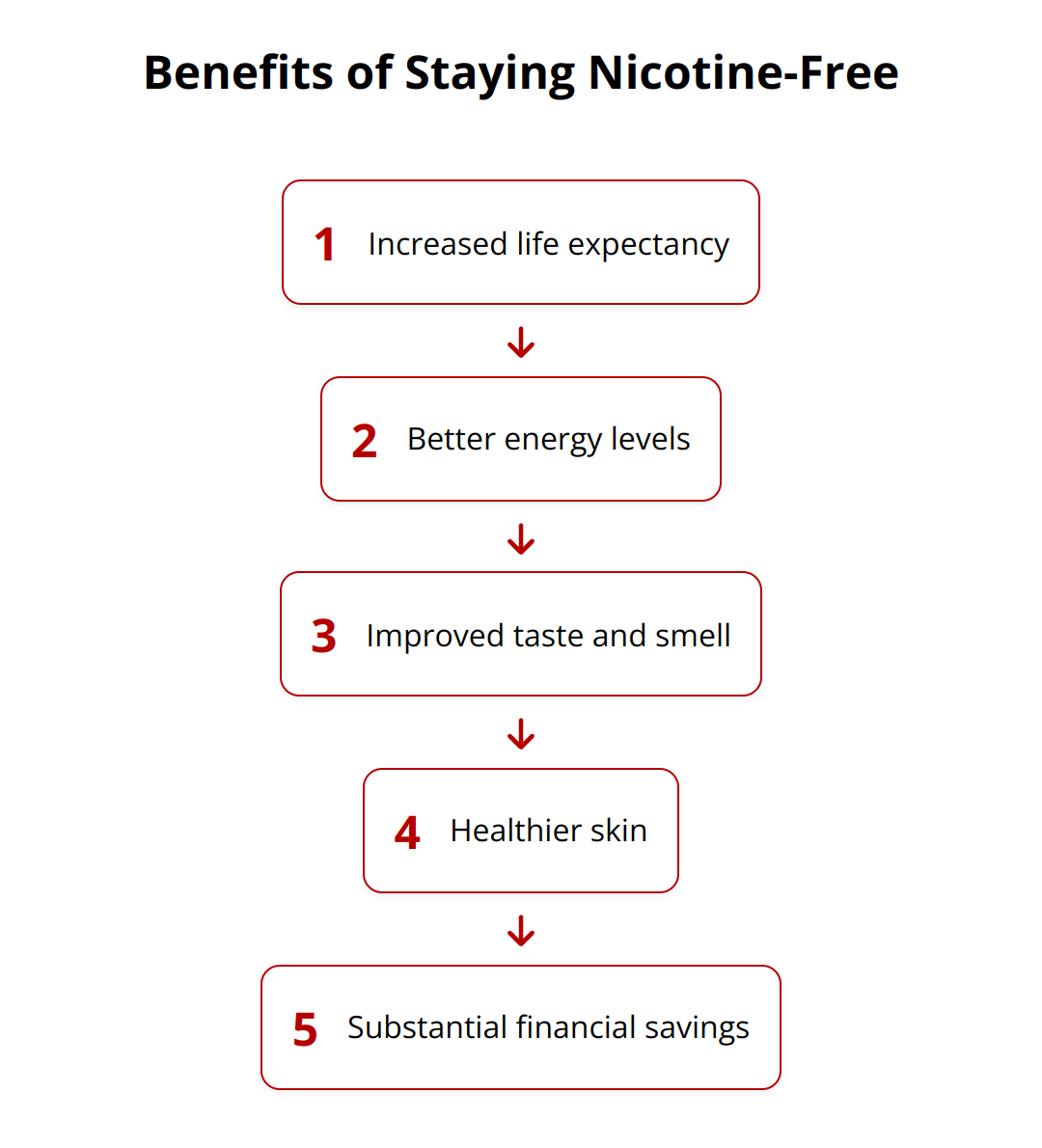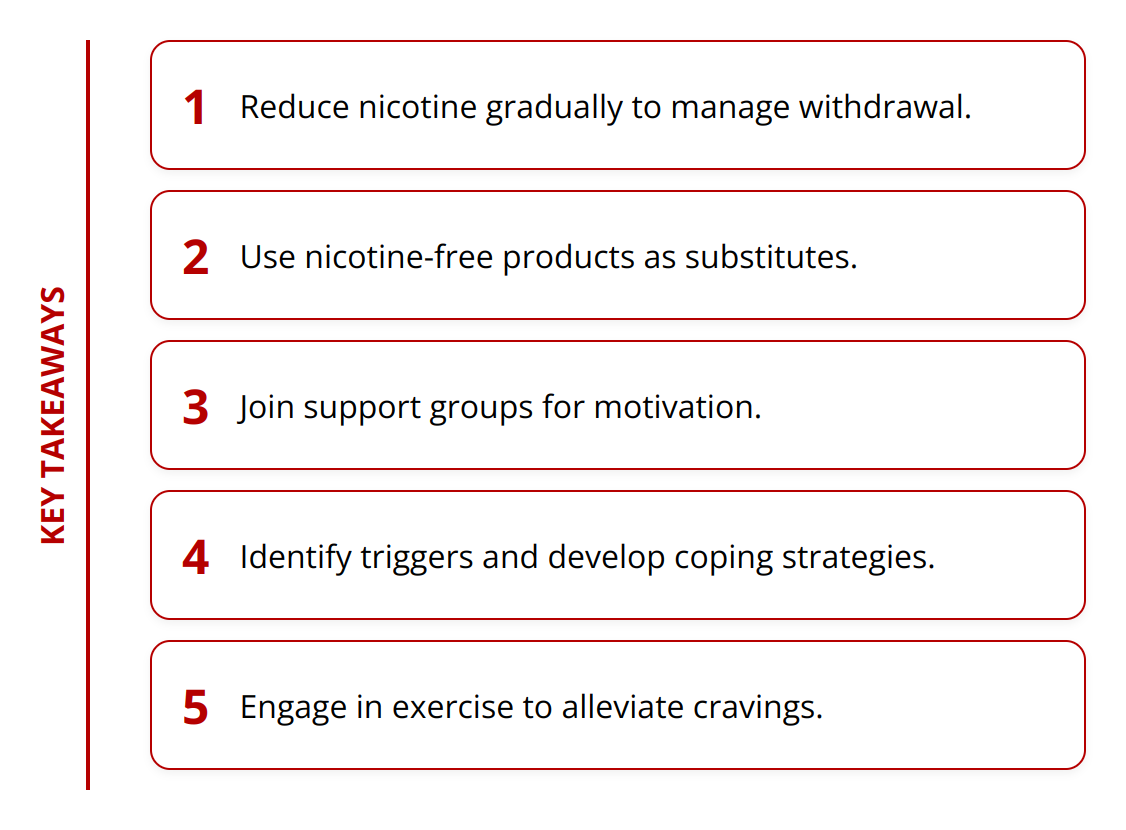
Herbal Smoking Wellness: All You Need to Know
Explore the benefits and tips of herbal smoking wellness with information on health impacts, botanical choices, and DIY blends.

Transitioning to a nicotine-free lifestyle offers numerous health advantages and can significantly enhance overall well-being.
At KHOOR, we are committed to providing practical tips and proven methods to help you quit nicotine. Let’s explore the best ways to make this important change and enjoy the long-term benefits.
Your journey towards a healthier, nicotine-free life starts here.
Transitioning to a nicotine-free lifestyle can yield impressive health benefits, making it a change worth striving for. Dropping nicotine leads to meaningful improvements in heart health, lung function, and mental well-being. Let’s get into the specifics.

Giving up nicotine drastically lowers the risk of heart disease. According to the American Heart Association, within just 20 minutes of quitting, your heart rate and blood pressure drop. After a year without nicotine, the risk of heart disease halves compared to current smokers. These rapid changes can add years to your life and reduce the chances of severe cardiac events.
Another significant benefit is improved lung function. Clearing your system of nicotine helps your lungs begin to repair. Research shows lung capacity can improve by up to 10% within nine months of quitting. This boost makes daily activities easier and lowers risks of lung infections such as bronchitis and pneumonia.
Finally, becoming nicotine-free positively impacts your mental health. Many people see a sharp drop in anxiety levels and depressive symptoms. Nicotine withdrawal initially makes you irritable, but the long-term benefits significantly outweigh the short-term discomfort. Studies have found ex-smokers report higher levels of happiness and lower stress levels than they did while smoking.

For more on the benefits of quitting nicotine and strategies to stay on track, check out this guide.
Making the switch yields both immediate and long-lasting health improvements. Reduced heart disease risk, better lung function, and enhanced mental health make a compelling case for this life-changing decision.
Quitting nicotine, while challenging, is achievable with the right approach. Here are some practical tips to guide you through the transition.
Start with Gradual Reduction
One of the most effective ways to quit is to gradually reduce your nicotine intake. Going cold turkey works for some, but tapering off allows the body to adjust. This method helps in managing withdrawal symptoms.
Consider Nicotine-Free Products
Substituting traditional nicotine products with nicotine-free alternatives can bridge the gap and make the quitting process smoother.

For a deeper dive into the benefits and options, check out these tobacco-free alternatives.
Seek Support
The journey to a nicotine-free life is easier with a robust support system.

Proven Tips
By implementing these strategies, you’re well on your way to a nicotine-free lifestyle. Embrace these best practices and experience the transformative benefits.
Staying nicotine-free offers undeniable benefits that improve both longevity and daily living. Here’s why committing to a life without nicotine is one of the best decisions you’ll ever make.
Living without nicotine significantly boosts life expectancy. Studies show that quitting smoking before the age of 40 reduces the risk of death from smoking-related diseases by about 90%, according to research published in the New England Journal of Medicine. Every year spent without nicotine adds more years to your life.
Your overall quality of life improves drastically when you quit nicotine. Here are some key areas where you can expect positive changes:
Quitting nicotine also brings substantial financial savings. Smokers can spend upwards of $2,000 annually on cigarettes. By quitting, that money stays in your pocket:
For guidance on maintaining a nicotine-free life, visit staying nicotine-free.

The benefits of staying nicotine-free extend well beyond immediate health improvements. They encompass significant financial savings and an enhanced everyday experience, making the choice to quit a lasting investment in your future.
Transitioning to a nicotine-free lifestyle brings impressive health benefits and enhances overall well-being. Removing nicotine from your life can lead to reduced risk of heart disease, improved lung function, and better mental health. The positive changes in your body start almost immediately and continue to grow over time.

Adopting best practices like gradual reduction, using nicotine-free alternatives, and seeking support are effective strategies to make quitting more manageable. Incorporate these tips, and you’ll be better equipped to face the challenges on your journey to a nicotine-free life.
Staying nicotine-free long-term not only increases life expectancy but also improves your quality of life with more energy, better senses, and healthier skin. Financial savings from quitting smoking add a substantial bonus, making the effort even more worthwhile.
At KHOOR, we offer a healthier option with our premium tobacco-free, nicotine-free herbal cigarettes. Available in flavors like Original, Menthol, Vanilla, and Berry Blue, our products provide a satisfying and smooth smoking experience without the harmful effects. Try our 4-pack flavor sampler or subscribe for added benefits like discounts and free shipping.
Embrace these practices and the support we provide to enjoy a healthier, nicotine-free future. For more resources and support, visit our support system.

Explore the benefits and tips of herbal smoking wellness with information on health impacts, botanical choices, and DIY blends.

Explore how KHOOR supports nicotine replacement with herbal cigarettes, success rates, and user stories for a healthier, smoke-free life.

Explore the benefits of quitting tobacco & nicotine with healthy alternatives. Improve your health and well-being with tips and data-backed advice.

Achieve your quit smoking goals with KHOOR’s supportive approach. Discover benefits, statistics, and practical tips for a healthier life.

Explore practical tips to smoke without nicotine, including product recommendations and real-life statistics to support your healthier lifestyle choices.

Explore tobacco-free alternatives with KHOOR. Learn about options like herbal cigarettes, nicotine pouches, and vaping for a healthier lifestyle.